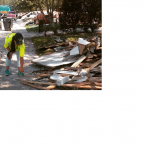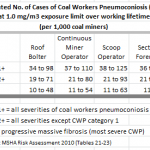Howard Berkes
It’s been nearly a month since Hurricane Harvey made landfall on August 25 off the Gulf coast of Texas. The Houston Chronicle continues its excellent coverage of the massive “clean-up” efforts in cities across the region. Today’s edition features photos and interviews from Dickinson, TX, a town about 30 miles southeast of Houston. More than 7,000 homes in Dickinson were either destroyed or damaged. Officials are telling “weary residents” it’s going to take some time to get all of the debris removed that they’ve placed outside of their houses, apartments, mobile homes.
Jessica Martinez and…
I started my post yesterday with my version of the famous quote from the film Casablanca:
“I'm shocked, shocked to find an epidemic of black lung disease.”
It was my reaction to the latest story by NPR’s Howard Berkes about nearly 2,000 recently diagnosed cases of the most severe form of black lung disease. They’ve been diagnosed over the last six years among coal miners in central Appalachia.
I gave five reasons to explain why I'm not shocked by the epidemic.
#1: Mine operators were allowed to expose miners to concentrations of respirable coal dust and silica that were…
I felt a little like Claude Rains (as Capt. Louis Renault) in the film Casablanca. He's the actor with the famous line "I'm shocked, shocked to find that gambling is going on here." On Sunday my neighbor asked me: “What do you think about all those coal miners with black lung?”
“Shocked, shocked,” I was tempted to say, but I’m not the least bit shocked.
My neighbor was referring to the latest story by NPR’s Howard Berkes about nearly 2,000 cases of progressive massive pulmonary fibrosis (PMF) diagnosed in the last six years among Appalachian coal miners. Two thousand cases is a hefty…
I’m still haunted by the voice on my car radio. It was one of those “NPR moments.”
We were parked at our destination, but there was no way we were getting out of the car. National Public Radio’s (NPR) Howard Berkes was reporting from eastern Kentucky and interviewing Mackie Branham. The 39 year old coal miner gasped for air over every word. Chills ran up my spine. Branham's lungs were hardened by coal mine dust. It was painful to listen yet the perfect punctuation for a powerful story.
Berkes’ reported findings of an NPR investigation of the incidence of the most severe form of coal workers’…
“Ugh,” “argh,” or a moan. That's what I typically hear from injured workers when they describe their experience maneuvering the workers’ compensation (WC) system. The trouble runs the gamut from insurers refusing to authorize treatment by specialists (e.g., an orthopedist,) to insisting they return to work despite their own physicians’ opinions that doing so will cause more harm, to only being paid a portion of their lost wages.
Well, if workers have it bad under WC, an alternative system looks even worse. ProPublica’s Michael Grabell and National Public Radio’s Howard Berkes report on…
By Dan Neal
Ensuring that U.S. workers return home from work healthy and in one piece requires pushing OSHA and other agencies to do more at the state and national levels to improve standards and aggressively enforce them. Meanwhile, health and safety advocates and workers must speak out loudly for worker rights, especially to protect workers who simply report safety problems at their jobs and to protect whistleblowers who reveal criminal behavior.
Those points were discussed last week in Baltimore at the 2015 National Conference on Worker Safety and Health. More than 280 workplace…
A quick way to lose someone in a conversation is to mention workers' comp. No doubt I’ve already lost readers because my headline included the phrase. But you’ll think differently about the topic if you take a look at this week’s reporting by ProPublica and National Public Radio. Read just the first 400 words of “The Demolition of Workers’ Comp” and you’ll be hooked on the story.
Yesterday morning, investigative reporters Michael Grabell and Howard Berkes discussed their reporting with NPR host David Greene. In the interview they noted:
“Since 2003, more than 30 states have passed laws…

